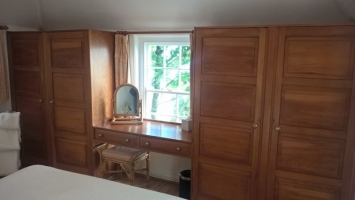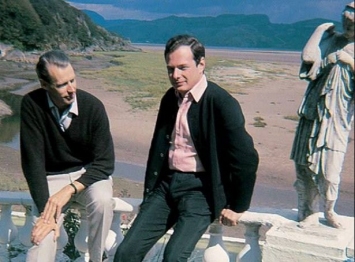THE FAB FOUR AND NUMBER SIX
A LOOK AT THE CONNECTIONS BETWEEN THE BEATLES, THE PRISONER, AND PORTMEIRION
The connections between The Beatles and The Prisoner, and Portmeirion are many, including most famously the use of the song 'All You Need is Love' in the final episode 'Fall Out'.
The track was chosen by music editor on 'The Prisoner', Eric Mival. He had used the band's music previously when editing at Worldwide Pictures, a UK-based multimedia production company.
Mival recalls discussing his choice with Patrick McGoohan, who asked him if he felt the song would date the series. Mival answered that "it would not and The Beatles have not failed me yet." The rest is history. A fee of approx. £50 (figures quoted have varied between £40 and £68) was paid for its use in perpetuity (ITC had the rights option to use the track, the band themselves were not directly involved in the decision). Eric tells of this in his recent memoirs 'Cutting Edge' (available HERE);
"It was down to me to find the music for it, and I chose what I thought would work... I did not feel it was such a big choice at the time and it cost as I recall £64 to use worldwide in royalty terms... I was keen to include the Beatles' track 'All You Need is Love' for irony's sake."
The original idea was that each jukebox in the corridor which Number Six walks down at the start of the episode would play a different piece of music (suggestions included 'Puppet on a String' by Sandie Shaw), but following the above conversation ‘All You Need is Love' became the only piece used in the sequence, based on the - ultimately correct - assumption that any other tracks would date the series. Mival would later work with George Harrison, as an editor on the movie 'Wonderwall'.
The Beatles were no strangers to having their music placed in TV shows: 'Ticket to Ride' featured in a 1965 episode of 'Doctor Who', and post 'The Prisoner' 'Get Back' in an episode of 'UFO,' 'Here Comes the Sun' later made it into an episode of comedy series 'Citizen Smith' which was also filmed in Portmeirion. The oft-repeated claim that McGoohan reached [an] agreement with the band to include the track as a 'favour' is incorrect.
Mival's choice has, of course, been thoroughly vindicated and speaking to TV World in 1967, McGoohan himself would heap praise on both the band and the song:
"I think The Beatles are marvellous. They are venturing into astonishing fields of music and are really searching in their embryonic 'retirement' to find new sounds. I am always listening to their latest work and get something new out of it each time I hear it. They epitomise the age. They parody all the things we grown-ups pay lip service to, but don't practise. In one of their latest numbers they sing "All you Need Is Love" - just that, over and over again. Afterwards you realize that love is the thing that we have least of. They parody such ambiguities''.
The respect went both ways.
George Harrison, whilst waxing lyrical about India (during an interview filmed in Portmeirion for "Anthology"), stated that “it was the first feeling I'd ever had of being liberated from being a Beatle or a number. It comes back to "The Prisoner" with Patrick McGoohan: ‘I am not a number.' In our society we tend, in a subtle way, to number ourselves and each other and the government does so, too…” Also, when talking about looking for a suitable and more meaningful script in the wake of "A Hard Day's Night" and "Help!" he said: “I remember we had Patrick McGoohan around, and he'd written a couple of episodes of a series called The Prisoner, which we liked very much. We thought, ‘Well, maybe he could write something for us.'”
McGoohan did indeed meet with the band and various film projects were discussed (including a version of 'Lord of the Rings' which was to have starred the band members, to be directed by McGoohan) but sadly nothing came to fruition, with McGoohan allegedly remarking that any project involving the band would have "five directors", with the band instead making 'Magical Mystery Tour' (which would coincidentally include Butler actor Angelo Muscat among its cast).
The village of Portmeirion was also a regular destination for the Beatles' manager Brian Epstein (who was responsible for many additions to Gate House cottage, such as the famous wardrobes in the cottage which he designed after remarking that there was no suitable space for his clothes). John Lennon and George Martin also visited, and George Harrison held his 50th birthday in the village.

One visit by Epstein and Martin in the summer of 1966, whilst Epstein was recovering from glandular fever, is captured in a photograph, but it was cut short as Epstein had to return to London to deal with the aftermath of comments made by Lennon earlier that year about The Beatles being more popular than Jesus.

Epstein had been a regular visitor for several years, as had Harrison to the area; he and Paul McCartney were spotted in the nearby town of Harlech as early as 1958 jamming with the band 'The Vikings'.
Harrison's connection with 'The Prisoner'would continue after his passing. George's son Dhani has since formed a music duo with Oli Hecks, which is called 'thenewno2'. Dhani named the band after the 'Village chairman' due to 'The Prisoner' being one of his father's favourite programmes. Harrison's interview for The Beatles' anthology series was filmed in Portmeirion.
Portmeirion's association with The Beatles continues, with locations manager Meurig Jones regularly putting on events in the village related to the band, including tours and live performances by tribute bands.